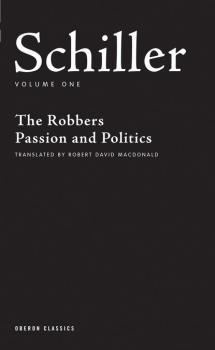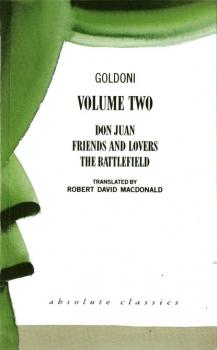Античная литература
Различные книги в жанре Античная литератураSchiller: Volume Three
Includes the plays Joan of Arc and William TellTwo plays about historical characters whose fame has also raised them to the level of myth. In Joan of Arc (1801), Schiller allows his heroine a more glorious death than her historical execution at the stake, and imbues her with more passion, and compassion, than is usually ascribed to the actual Joan.In William Tell (1805), often regarded as his greatest play, Schiller creates a vivid sense of time and place – medieval Switzerland – and in his troubled hero, the accidental revolutionary Tell, create a complex and fascinating figure.One of the great figures in German literature, Friedrich Schiller (1759-1805) was in some ways the most significant playwright of his day, numbering among his devotees Coleridge and Carlyle. His plays are known for their originality of form, vivid stage imagery and powerful language, faithfully rendered in Robert David MacDonald's acclaimed translations
Schiller: Volume One
Includes the plays The Robbers and Passion and PoliticsTwo plays concerned with tyranny and freedom. Schiller's first play, The Robbers (1781), was written in great secrecy under the prison like conditions of Württenberg's Karlsschule: Karl, the son of a count, is disinherited through the machinations of his brother Franz, and, turning his back on a social order he finds unjust and corrupt, becomes the leader of a band of robbers. In Passion and Politics (1784), a 'bourgeoise tragedy', the love between Louise, a musician's daughter, and Ferdinand, a politician's son, crosses an unbridgeable social divide.One of the great figures in German literature, Friedrich Schiller (1759-1805) was one of the most significant playwrights of his day, numbering among his devotees Coleridge and Carlyle. His plays are known for their originality of form, vivid stage imagery and powerful language, faithfully rendered in Robert David MacDonald's acclaimed translations.
Goldoni: Volume Two
Carlo Goldoni (1707 – 1793) was one of the most prolific and versatile playwrights of his century, even though most of his vast output deals with life confined to a few square miles of Northern Italy. Includes the plays Don Juan, Friends and Lovers and The BattlefieldThe first published English-language edition of Goldoni’s worldly vision of the Don Juan legend, in verse, alongside translations of the naturalistic Friends and Lovers and The Battlefield, all of which were first seen at the Citizens Theatre in Glasgow.
Bakkhai
Pentheus has banned the wild, ritualistic worship of the god Dionysos. A stranger arrives to persuade him to change his mind. Euripides’ electrifying tragedy is a struggle to the death between freedom and restraint, the rational and the irrational, man and god.
Oresteia
Orestes’ parents are at war. A family drama spanning several decades, a huge, moving, bloody saga, Aeschylus’ greatest and final play asks whether justice can ever be done – and continues to resonate more than two millennia after it was written. This new adaptation of Oresteia was first performed at the Almeida in Summer 2015, marking the first major London production of Oresteia in over a decade.
Medea
Medea’s marriage is breaking up. And so is everything else. Testing the limits of revenge and liberty, Euripides’ seminal play cuts to the heart of gender politics and asks what it means to be a woman and a wife.
Antigone
When her dead brother is decreed a traitor, his body left unburied beyond the city walls, Antigone refuses to accept this most severe of punishments. Defying her uncle who governs, she dares to say ‘No’. Forging ahead with a funeral alone, she places personal allegiance before politics, a tenacious act that will trigger a cycle of destruction.
Sommer 14: A Dance of Death
Wars do not break out, they are not brokered or declared as is always written. They are brought about by those who desire them.' In June 1914, Europe was enjoying unprecedented peace and prosperity. Little over a month later, the world was at war – and only a handful of people knew it was happening. Inspired by the medieval mystery plays, Sommer 14: A Dance of Death is an epic telling from a German and European perspective of the world's descent into war. Employing the character of Death as a guide, the play uses the classic Danse Macabre structure of a series of searing vignettes to illuminate the people and the events that led up to the outbreak of the First World War. 'The dead are amongst us, they are inside us. They demand of us that we answer for our crimes.' Sommer 14: A Dance of Death is a hugely ambitious epic vision of the Great War from one of Europe's most acclaimed – and most controversial – dramatists, published to coincide with the UK premiere and the English world premiere at the Finborough Theatre in a brand-new translation by Gwynne Edwards.
The Seven Pomegranate Seeds
With the story of a lost child resonating throughout, these seven contemporary monologues for female speakers are loosely based on seven of Euripides’ most famous female characters; Medea, Phedra, Demeter, Persephone, Hypsipyle, Creusa and Alcestis. While individually they explore classical mother and child stories they come together in a compelling conclusion. Originally commissioned by the Onassis Programme at Oxford University where they were first performed by triple Olivier award-winner, Clare Higgins.
Covering Shakespeare
David Weston has spent a lifetime acting in Shakespeare’s plays, and has been directed by Peter Hall, Trevor Nunn and Simon Croft. Chosen as Ian McKellen’s understudy in the RSC’s King Lear, he toured the world and recorded his experiences in his diary, which became the award-winning Covering Shakespeare: An Understudy’s Tale, called ‘Salty, evocative and informative’ by the Daily Mail. It went on to win the prestigious I.T.R. Theatre Book of the the Year Prize for 2012. With Covering Shakespeare he goes even further, tracing his sixty-two year association with the Bard. He has appeared in twenty-nine of the thirty-seven plays, many several times, and has worked with all the major companies to the outmost limits of the Fringe, from Hollywood to Hong Kong, with the great, the mediocre and the forgotten. He has stories and reminiscences about them all, written in his inimitable style.









